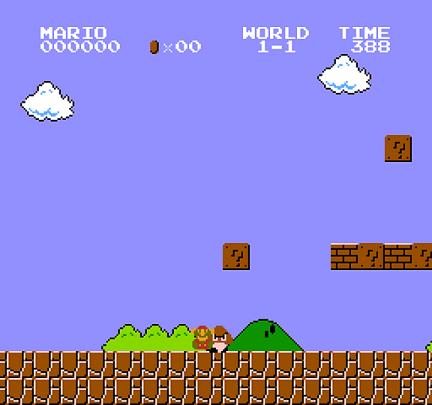
*Let me just offer this as a legitimate and all-excusing disclaimer: I am not, nor do I claim to be knowledgeable about video games in any way. Please don't take my word for it on any technical points by any means. I don't know the names of the versions and all of the release dates. Please accept my humble offering of Mario love. Thank you.
I like that we all just accept it as fact that a stubby little Italian guy with a face-consuming mustache battles obstacles and adversarial Koopas to rescue Princess Peach (nee Toadstool). Even as I'm typing it, a small part of me is still thinking, well, of course, it makes perfect sense. Mushrooms give you power and flowers give you fireballs and if you shimmy down a tube, you enter the mysterious minus world where the coins make that satisfying "ding" with each collection. Duh. Everyone knows that.
Mario and all of his spin-offs have become such a ubiquitous part of our culture that we're all willing to go along with that plot line and say, yeah, why not? That's just the way it is. Have you ever tried describing a video game to someone who had never played a video game? You'll find that this intricate gamer world that you navigate without question is probably the most bizarre thing they have ever heard. It's the delightful escapism of video games: they're not the real world, nor do they pretend to be grounded in it. In this world, anything goes, and you always get to play the hero. Where do I sign up?
I admit I was not much of a Nintendo aficionado growing up. Not for lack of want, but more for lack of brothers. My parents never saw fit to buy my sister and I our own video game system, though we were allowed to play Mario and Tetris on my mom's Gameboy. Before you pooh-pooh my shaky gamer credentials, let it be noted that my mom used to bring me to work and in order to escape the tedium I'd sneak of to play their giant arcade game of Super Mario Bros. Don't ask me why they had this in a nursing home. I don't know. It makes no sense, so the only explanation was that it existed solely for me to delight in the incredibly addictive world of Mario. I appreciate the gesture, but did you have to put it next to that weird aviary thing? The chirping is sort of distracting.
This was the version I played, though admittedly with less skill. I still love that music. It's so satisfying when you get to that flag. Such joyful beeping. Ah, the memories.
I have also spent the last 30 minutes playing Super Mario Bros online here. Under the guise of doing research, I found myself cursing aloud over missed coin opportunities, unintentional mushroom collisions, and failure to catch a falling star. It just isn't the kind of game you can play halfway. It's all or nothing, and in most cases, it was all.
In the 80s and 90s, video games had a far different look and feel than video games of today. The violence was more lighthearted, our aims more simplistic, and our graphics admittedly more pixelated. That's not to say the games weren't complicated. The Mario games alone were a world unto themselves. On the other hand, our hero was a stocky Italian-American plumber sporting flamboyant red overalls. I guess we'll just have to take Nintendo's word for it that he's fully qualified for such a hefty task.
Mario and his younger brother Luigi were residents of the Mushroom Kingdom. As the name implies, their homeland was indeed a monarchy, home of our beloved Princess Peach (or Toadstool, depending on which version you're looking at). I have to admit, I am such a girl. I always loved the Princess best. I always liked Super Mario Bros 2 because you had the option of playing as her, and she was a pretty awesome hoverer. In other versions, I was nowhere near adept enough at Nintendo gameplay to actually ever make a legitimate rescue (or, let's admit, even come close) but I did totally reach the Princess in Mario Teaches Typing. I kicked ass at that game.*
I like the way they claim this version (Super Mario World) is "more realistic". Do explain.
For some reason, when their beloved Princess is in peril the kingdom turns not to some sort of qualified combatant but rather to our little mustachioed plumber in overalls. You literally get to root for the little guy. Mario is tiny. Bite size. Pocket size. Fun size. You get the picture.
Mario was originally known as "jumpman", which is not particularly surprising when you observe his vertical bounce prowess. As a player, jumping became our major means of defending ourself and obtaining valuable powers and weaponry. Our journey is treacherous; weird creatures throwing crap at us, knocking us off of things, and generally standing in the way of our honest and decent quest. When those crazy turtle-bird dealies** started ricocheting back and forth and threatening to knock me off my little brick walkway, I was pretty much toast.
 This is probably the coolest thing I've ever seen. I'm aware that this confirms my status as a huge nerd, but that does not in any way stop me from coveting this cake
This is probably the coolest thing I've ever seen. I'm aware that this confirms my status as a huge nerd, but that does not in any way stop me from coveting this cakeWe braved underwater levels, underground levels, sky levels, warp land, and all sorts of other exotic video game worlds to rescue our fair princess. For those of us caught time after time with a disappointingly premature death (read: me playing the flash version online right now), the game was endlessly frustrating. The sheer joy at beating a level was the ultimate triumph, while the crushing disappointment of being killed yet again by that same stupid fall was the ultimate defeat.
While most kids fought their way through and persevered, showing their hard-working earnestness and goodness of spirit, I was not among them. I was more the type to say, screw it. I'm going to play Duck Hunt. I get a gun in that game.***
*Yes, I recognize that a typing game is notably dorkier than a video game and achievements are thus far less admirable. Thank you for pointing that out.
**I'm aware that there's got to be some real name for these things
***Can you believe it? A gun!







